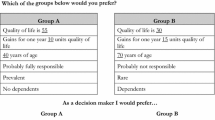Abstract
This contribution seeks to measure preferences for health insurance of individuals with and without chronic conditions in two countries, Germany and the Netherlands. The objective is to test the presumption that preferences between these two subpopulations differ and to see whether having a chronic condition has a different influence on preferences depending on the country. The evidence comes from two Discrete Choice Experiments performed in 2005 (Germany) and 2006 (the Netherlands, right after a major health reform). Results point to an even more marked resistance against restrictions of physician choice among individuals with chronic conditions in both countries. Thus, the alleged beneficiaries of Disease Management Programs would have to be highly compensated for accepting the restrictions that go with them.

Similar content being viewed by others
References
Bartholomee, Y., Maarse, H.: Empowering the chronically ill? Patient collectives in the new Dutch health insurance system. Health Policy 84(2–3), 162–169 (2007). doi:10.1016/j.healthpol.2007.03.008
Ben-Akiva, M., Lerman, S.R.: Discrete choice analysis. MIT Press, Cambridge, Mass (1985)
Beck, M., Gyrd-Hansen, D.: Effects coding in discrete choice experiments. Health Econ. 14, 1079–1083 (2005). doi:10.1002/hec.984
Cunningham, P.J., Denk, C.: Do consumers know how their health plan works? Health Aff. 20(2), 159–166 (2001). doi:10.1377/hlthaff.20.2.159
Douven, R., Lieverdink, H., Ligthart, M., Vermeulen, I.: Measuring short-term price elasticities in Dutch health insurance: a new method (June 14, 2007). iHEA 2007 6th World Congress: Explorations in Health Economics Paper. Available at SSRN: http://ssrn.com/abstract=993741
Glazer, J., McGuire, T.: Optimal risk adjustment in markets with adverse selection: an application to managed care. Am. Econ. Rev. 90, 1055–1071 (2000)
Green, D., Benedict, I.: Health care in France and Germany: lessons for the UK. Civitas, Institute for the Study of Civil Society, London (2005)
Hensher, D., Louviere, J., Swait, J.: Combining sources of preference data. J. Econom. 89, 197–231 (1999). doi:10.1016/S0304-4076(98)00061-X
de Jong, J.D., Van den Brink-Muinen, A., et al.: The Dutch health insurance reform: switching between insurers. A comparison between the general population and the chronically ill and disabled. BMC Health Serv. Res 8, 5 (2008). doi:10.1186/1472-6963-8-58
Louviere, J.L., Hensher, D.A., et al.: Stated choice methods. Analysis and applications. Cambridge University Press, Cambridge, Mass (2000)
McFadden, D.: Conditional logit analysis of qualitative choice behavior. In: Zarembka, P. (ed.) Frontiers in econometrics, pp. 105–142. Academic Press, New York (1974)
Ministry of Health, Welfare and Sports (2008, February 25, 2008), Health insurance system, Retrieved 29 April 2008
Okma, K.G.H.: Health care, health policies and health care reforms in the Netherlands. Ministry of Health, The Hague (2001)
Rothschild, M., Stiglitz, J.: Equilibrium in competitive insurance markets. An essay on the economics of imperfect information. Q. J. Econ. 90(4), 629–649 (1976). doi:10.2307/1885326
Schreyögg, J., Markus, G.: Copayments for ambulatory care in Germany: a natural experiment using a difference-in-difference approach, SOEP paper (96). German Institute for Economics, Berlin, Germany (2008)
Schut, F.I.: Universal mandatory health insurance in the Netherlands: a model for the United States? Health Aff. 27(3), 771–781 (2008). doi:10.1377/hlthaff.27.3.771
Tamm, M., Tauchmann, H., Wasem, J., Greß, S.: Elasticities of market shares and social health insurance choice in Germany: a dynamic panel data approach. Health Econ. 16(3), 243–256 (2007). doi:10.1002/hec.1167
WHO: Health for all Database, World Health Organization (2008)
Zweifel, P., Breuer, M.: The case for risk-based premiums in public health insurance, health economics. Policy Law 1(2), 171–188 (2006)
Zweifel, P., Breyer, F., Kifmann, M.: Health economics, 2nd edn. Springer, Boston (2009)
Acknowledgments
Helpful suggestions and criticisms were provided by participants of the Ottobeuren 2008 workshop (in particular Stefan Felder) as well as Harry Telser and Karen Becker (Polynomics Inc.), and Stephanie Berner (University of Zurich). Financial support by the Bertelsmann Foundation and Büchner Foundation is gratefully acknowledged.
Author information
Authors and Affiliations
Corresponding author
Rights and permissions
About this article
Cite this article
Vroomen, J.M., Zweifel, P. Preferences for health insurance and health status: does it matter whether you are Dutch or German?. Eur J Health Econ 12, 87–95 (2011). https://doi.org/10.1007/s10198-010-0248-0
Received:
Accepted:
Published:
Issue Date:
DOI: https://doi.org/10.1007/s10198-010-0248-0




